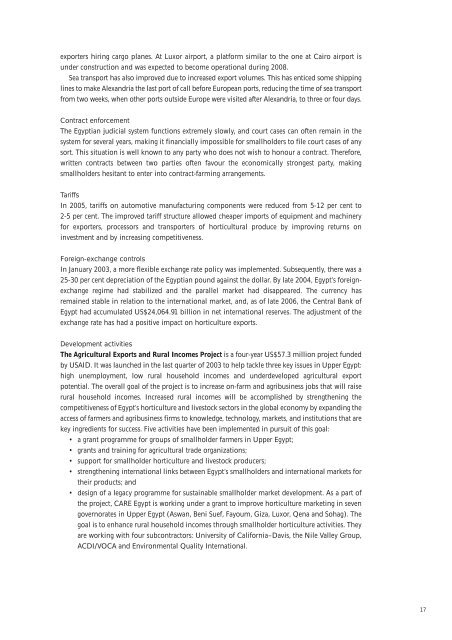Egypt: Smallholder contract farming for high-value and ... - IFAD
Egypt: Smallholder contract farming for high-value and ... - IFAD
Egypt: Smallholder contract farming for high-value and ... - IFAD
You also want an ePaper? Increase the reach of your titles
YUMPU automatically turns print PDFs into web optimized ePapers that Google loves.
exporters hiring cargo planes. At Luxor airport, a plat<strong>for</strong>m similar to the one at Cairo airport is<br />
under construction <strong>and</strong> was expected to become operational during 2008.<br />
Sea transport has also improved due to increased export volumes. This has enticed some shipping<br />
lines to make Alex<strong>and</strong>ria the last port of call be<strong>for</strong>e European ports, reducing the time of sea transport<br />
from two weeks, when other ports outside Europe were visited after Alex<strong>and</strong>ria, to three or four days.<br />
Contract en<strong>for</strong>cement<br />
The <strong>Egypt</strong>ian judicial system functions extremely slowly, <strong>and</strong> court cases can often remain in the<br />
system <strong>for</strong> several years, making it financially impossible <strong>for</strong> smallholders to file court cases of any<br />
sort. This situation is well known to any party who does not wish to honour a <strong>contract</strong>. There<strong>for</strong>e,<br />
written <strong>contract</strong>s between two parties often favour the economically strongest party, making<br />
smallholders hesitant to enter into <strong>contract</strong>-<strong>farming</strong> arrangements.<br />
Tariffs<br />
In 2005, tariffs on automotive manufacturing components were reduced from 5-12 per cent to<br />
2-5 per cent. The improved tariff structure allowed cheaper imports of equipment <strong>and</strong> machinery<br />
<strong>for</strong> exporters, processors <strong>and</strong> transporters of horticultural produce by improving returns on<br />
investment <strong>and</strong> by increasing competitiveness.<br />
Foreign-exchange controls<br />
In January 2003, a more flexible exchange rate policy was implemented. Subsequently, there was a<br />
25-30 per cent depreciation of the <strong>Egypt</strong>ian pound against the dollar. By late 2004, <strong>Egypt</strong>’s <strong>for</strong>eignexchange<br />
regime had stabilized <strong>and</strong> the parallel market had disappeared. The currency has<br />
remained stable in relation to the international market, <strong>and</strong>, as of late 2006, the Central Bank of<br />
<strong>Egypt</strong> had accumulated US$24,064.91 billion in net international reserves. The adjustment of the<br />
exchange rate has had a positive impact on horticulture exports.<br />
Development activities<br />
The Agricultural Exports <strong>and</strong> Rural Incomes Project is a four-year US$57.3 million project funded<br />
by USAID. It was launched in the last quarter of 2003 to help tackle three key issues in Upper <strong>Egypt</strong>:<br />
<strong>high</strong> unemployment, low rural household incomes <strong>and</strong> underdeveloped agricultural export<br />
potential. The overall goal of the project is to increase on-farm <strong>and</strong> agribusiness jobs that will raise<br />
rural household incomes. Increased rural incomes will be accomplished by strengthening the<br />
competitiveness of <strong>Egypt</strong>’s horticulture <strong>and</strong> livestock sectors in the global economy by exp<strong>and</strong>ing the<br />
access of farmers <strong>and</strong> agribusiness firms to knowledge, technology, markets, <strong>and</strong> institutions that are<br />
key ingredients <strong>for</strong> success. Five activities have been implemented in pursuit of this goal:<br />
• a grant programme <strong>for</strong> groups of smallholder farmers in Upper <strong>Egypt</strong>;<br />
• grants <strong>and</strong> training <strong>for</strong> agricultural trade organizations;<br />
• support <strong>for</strong> smallholder horticulture <strong>and</strong> livestock producers;<br />
• strengthening international links between <strong>Egypt</strong>’s smallholders <strong>and</strong> international markets <strong>for</strong><br />
their products; <strong>and</strong><br />
• design of a legacy programme <strong>for</strong> sustainable smallholder market development. As a part of<br />
the project, CARE <strong>Egypt</strong> is working under a grant to improve horticulture marketing in seven<br />
governorates in Upper <strong>Egypt</strong> (Aswan, Beni Suef, Fayoum, Giza, Luxor, Qena <strong>and</strong> Sohag). The<br />
goal is to enhance rural household incomes through smallholder horticulture activities. They<br />
are working with four sub<strong>contract</strong>ors: University of Cali<strong>for</strong>nia–Davis, the Nile Valley Group,<br />
ACDI/VOCA <strong>and</strong> Environmental Quality International.<br />
17

















